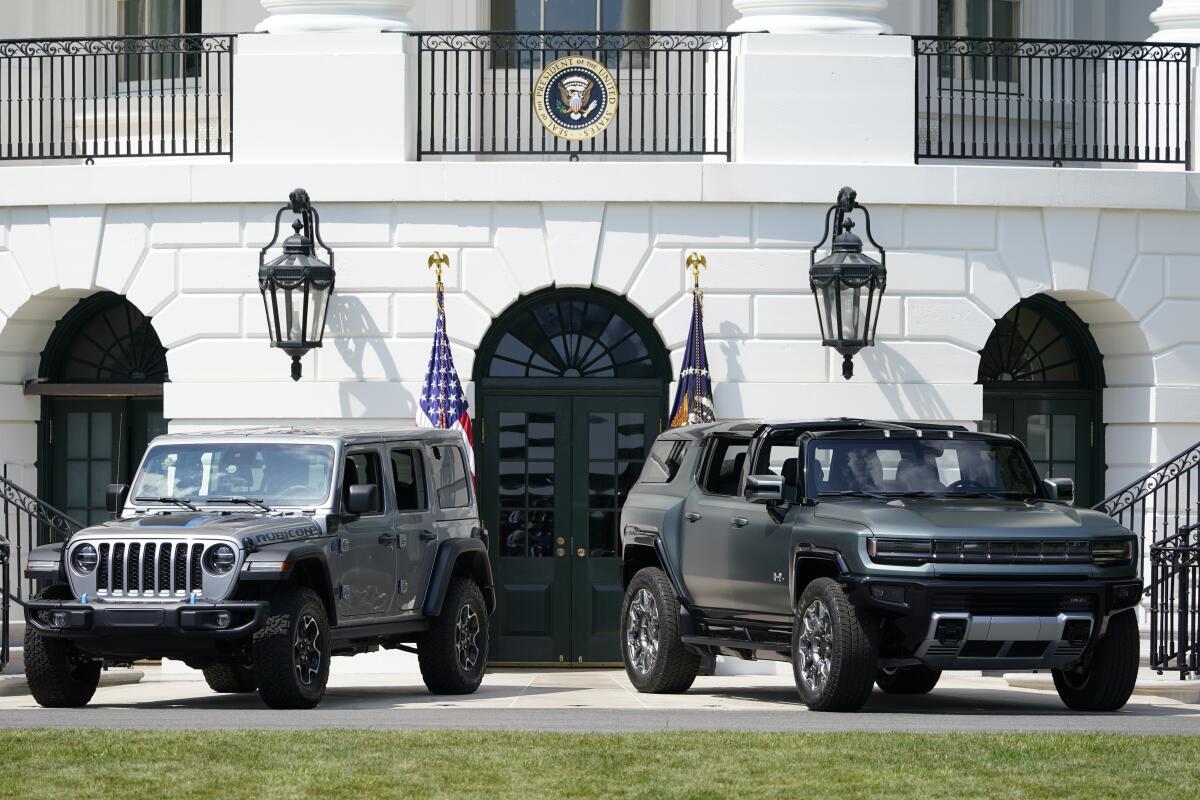Biden holds event touting EVs; Tesla, top U.S. seller of EVs, is not invited

President Biden invited what used to be called Detroit’s big three automakers to the White House to promote sales of electric vehicles — leaving off the guest list the company that sells more than any other: Tesla Inc.
“Yeah, seems odd that Tesla wasn’t invited,” Elon Musk, Tesla’s chief executive, said in a tweet.
Also left out: Nissan Motor Co., whose Leaf was a pioneer in electric cars; Honda Motor Co., the first Japanese automaker to promise to phase out gasoline-powered cars; and Volkswagen AG, which is spending over $2 billion on electrification research and development as penance for a diesel cheating scandal.
Toyota Motor Co., which developed the top-selling hybrid car in the form of the Prius, was also absent.
The obvious difference is the companies in attendance, General Motors Co., Ford Motor Co., and Stellantis NV, have deep roots in the U.S. and use union labor — a point not lost on United Auto Workers President Ray Curry, who was also invited to be on the White House lawn Wednesday. Stellantis, formed earlier this year from the merger of Fiat Chrysler and PSA Group, is headquartered in Europe.
“We are falling behind China and Europe as manufacturers pour billions into growing their markets and expanding their manufacturing,” Curry said in a statement before the event. “We need to make investments here in the United States.”
Biden has made reviving U.S. manufacturing and support of labor pillars of his Build Back Better economic plan. Although several of the foreign-owned carmakers sell EVs in the U.S., and many operate factories here, they have generally built their plants in right-to-work states and have successfully thwarted efforts by unions to organize them.
Biden’s nod to the union comes as his party is working to recapture the white working-class voters who used to be part of the Democratic core ahead of the 2022 midterm elections, said Paul Sracic, a Youngstown State University professor of politics and international relations.
With pickups outselling passenger cars in the U.S., Ford is betting big on the proposition that lovers of big, noisy trucks can be sold on the virtue of electric motors.
“Traditionally, the vote has been union oriented, union friendly. Whether they can get that vote back is an open question,” Sracic said in a phone interview. “It looks like they are trying to stay on message to show a pro-labor, pro-union friendliness. The optics for the White House are better this way.”
Asked on Bloomberg TV’s “Balance of Power With David Westin” why Tesla wasn’t invited to the event, Ali Zaidi, deputy White House climate advisor, praised the company’s innovation and pointed out it received an Energy Department loan, which it has repaid.
But, he added, “we are excited about getting the UAW together with three of their largest employers on our campus.”
The event was convened for Biden to announce an executive order establishing the goal for half of all cars sold to be battery-electric, plug-in hybrid or fuel-cell-powered by 2030. Biden also announced his administration was crafting greenhouse-gas-reduction standards and fuel-economy requirements for vehicles, including medium-duty and heavy-duty trucks.
The UAW endorsed Biden in his presidential race in early 2020.
The three traditional Detroit automakers accounted for about 39% of all new-car sales in the U.S. in the first half of the year, according to data from Cox Automotive. Toyota’s 15.5% share topped both Ford’s and Stellantis’, and ranked second behind market leader GM’s 15.9%.
“We of course welcome the efforts of all automakers who recognize the potential of an electric future and support efforts that will help reach President Biden’s goal, including the automakers who are committed to electrifying their fleet and reducing emissions,” the White House said in a statement.
“Our members would have welcomed the opportunity to be at the White House today,” said Jennifer Safavian, president of Autos Drive America, a trade group of foreign automakers.
“International automakers account for half of all new vehicle sales and manufacturing in the United States and are committed to building a greener car market,” she said in a statement. “We hope that President Biden recognizes the efforts of the entire U.S. auto industry that continues to invest billions into their manufacturing operations and American workforce.”
If they felt snubbed, it didn’t come through in statements issued by some of the uninvited other than Tesla.
“With LEAF, Nissan showed our pioneering spirit in electric vehicles,” said Jeremie Papin, chairperson of Nissan Americas. “Nissan is fully committed to doing our part toward building a cleaner, safer and more inclusive society for all.”
Scott Keogh, president of Volkswagen Group of America, said on LinkedIn that the company was spending $800 million on a plant to assemble electric vehicles in Chattanooga, Tenn.
“Today, the Biden administration will issue new rules that present our industry with tough new challenges. And here’s the thing: I like ‘em,” Keogh wrote.
“In fact, I’m thrilled with the Environmental Protection Agency’s latest move to reduce greenhouse gas emissions,” he said. “It means federal policy is finally catching up to what we realized years ago: we must head towards a cleaner future together — and electric vehicles are what will drive us there.”






